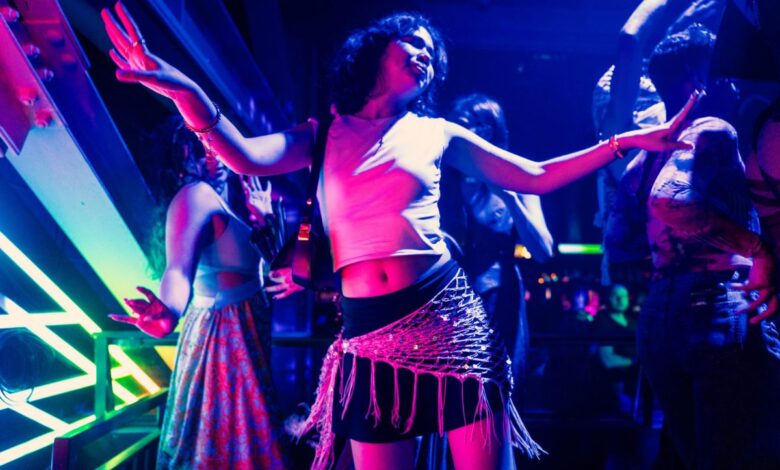Building a SWANA ecosystem on dance floors and beyond

Founded in 2018, the collective Laylit emerged from a time of urgency and frustration as the first Trump presidency furthered negative stereotypes of immigrant communities and endangered the future of Southwest Asian and North African (SWANA) diasporic communities through policies such as the Muslim ban. Desiring a platform to express their identities unapologetically, the founders of Laylit—Lebanese musicians MNSA and Nadim Maghzal, both of electronic duo Wake Island, and Syrian DJ Saphe Shamoun—came together to make and take space for the SWANA music and dance scene to flourish in North America. The acclaimed Laylit party tours through Chicago for a one-night debut on Saturday, April 19, at Sleeping Village, platforming SWANA artists in the music and dance scenes.
Laylit
Sat 4/19, 10 PM, Sleeping Village, 3734 W. Belmont, sleeping-village.com, $30, $25 advance, $20 early bird, 21+
MNSA has roots as a classical pianist, and music became an integral part of his life at an early age growing up in Lebanon. He emigrated to Canada around 2002 and joined his first band in 2005, focusing on rock, and soon started his own group that transformed into Montreal-based electronic duo Wake Island.
After another decade in the music scene, he and his closest collaborators began to feel like something was off. During the emergence of the first Trump presidency, MNSA realized, “For years, playing in rock bands and playing in the rock scene, we had to really adapt to North America and kind of be white in a way, you know, to be accepted in a scene like this.” Thus began the genuine intention to musically reconnect with Arab culture to “stop erasing it” from their work.
“When we arrived in Canada, it was right after 9/11, so it was not cool to be Arab. We were encouraged to hide it,” says MNSA. With Shamoun and Maghzal, he started a journey of music discovery, listening to artists from throughout the SWANA region. DJing emerged as an organic vehicle to share music they had overlooked growing up, as mixes could put the traditional in conversation with the modern. The three of them founded Laylit in 2018 and joined a quickly growing scene for SWANA party experiences in New York.
Laylit’s conceit was simple: The founders wanted to develop a platform for people within the music scene to be amplified to a general audience. At the time, there were not a lot of SWANA DJs, so the team would play parties for free and meet other artists along the way. A network of emerging artists developed as collaborations blossomed into a flourishing scene. Some Laylit parties take over multilevel venues, with 17 DJs rotating throughout the night across different rooms.
“Seven years later, we’re still at it,” MNSA asserts. “But today, we’re more established. The scene is more established, even. It’s no longer this rare thing, at least in some cities. Not every city, obviously—but in New York, it’s not as rare as it was before.”
Chicago’s emergence as a city for SWANA cultural talent has been slow but steady. DJ Nanoos’s viral TikTok sets paved the way for her Musiqa Baladi tour; Palestinian pop princess Amira Jazeera releases her first album at the end of April; and Salon Kawakib and other community groups produce monthly events platforming local diaspora talent and organizers. More recently, acclaimed parties helmed by international talents such as DJ Habibeats have toured here.
In committing to uplifting and celebrating local talent, Laylit’s Chicago tour stop features DJ A. Parssi of Shokoufeh—a dance night focusing on SWANA pop, disco, electronic, and psych-rock from across the decades—and Egyptian multidisciplinary sound artist NAXÖ.
Parssi got her start as a DJ hosting radio shows at their college station. First a photography and collage artist, her transition into music direction and DJing was accidental as she discovered the viability of her passion as an advocate for artists. “I so strongly believe that radio is such a special platform for discovering music, and I want as many voices being played as possible in terms of, like, background or style or identity,” Parssi says.
Parssi is a music director at CHIRP Radio, and her interest in SWANA music was piqued by a Turkish band’s record that came across her desk. Later, she experienced Disco Tehran in New York and wondered why Chicago lagged in producing such spaces for people of the SWANA diaspora. She dreamed of creating a Persian New Year party, and soon she’d created Shokoufeh to provide a platform for it—an intimate, itinerant dance series that has so far popped up at Cole’s Bar, Sleeping Village, and Podlasie.
Parssi visited New York for work, where she found a model for the scene she’d love to see in Chicago. “It was nice to see that multiple parties could exist,” she says. Those parties had coalesced to create a strong network of SWANA artists intending to gather and find one another.
As history repeats itself in another Trump presidency, MNSA affirms, “It seems like there’s an ecosystem of SWANA art being built right now, trying to take space in the culture. This is essential for us—taking space.”
https://chicagoreader.com/wp-content/uploads/2025/04/Photos-by-Hany-Osman-@hnyosmn-A7408972-scaled-e1744823059900.jpg
2025-04-17 10:30:49




